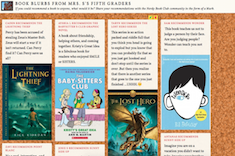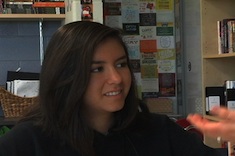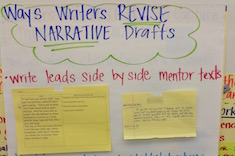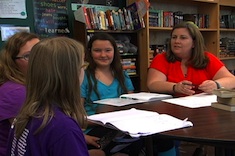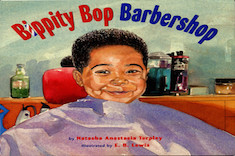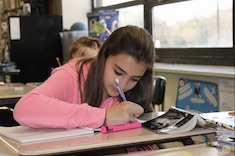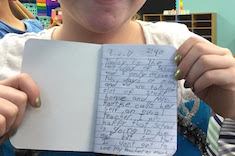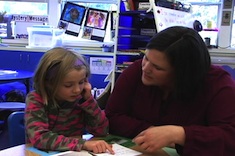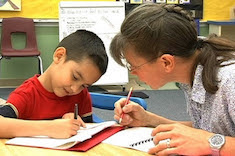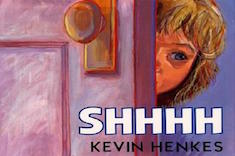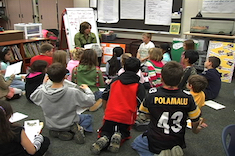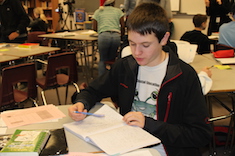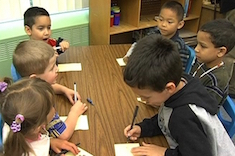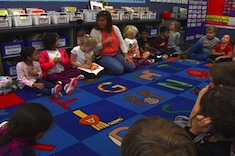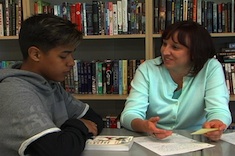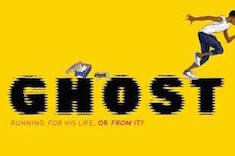Library
Choice Literacy Articles & Videos
The Choice Literacy library contains over 3,000 articles and 900 videos from 150+ contributors. Classic Classroom and Literacy Leadership subscribers have access to the entire library. Content is updated continuously, with five to six new features published each week.
Latest Content
Writing Effective Conclusions
Anadiplosis, tricolon, syntax and such — when Gretchen Schroeder's high school students are stuck in rhetorical ruts, she teaches them some new rhetorical tricks for crafting conclusions.
The Quote Collector
Are you a quote collector? Stephanie Affinito shares her love of quotes with students and also enlists them as quote collectors.
Teaching Summary with Book Blurbs
Katherine Sokolowski finds her fifth graders can give detailed retellings during conferences, but struggle to come up with succinct summaries. Writing book blurbs is her creative solution for building summarizing skills.
Writing a Strong Conclusion to a Literary Analysis Essay
Christy Rush-Levine helps eighth grader Katherine sort through tools and strategies for writing a strong conclusion to her literary analysis essay.
The Big Fresh November 4, 2017 Neighborhood Library
We look at mentor texts from many angles in this week’s Big Fresh.
Using Mentor Texts Across the Writing Process
Tara Barnett and Kate Mills describe how they use one mentor text, Owl Moon, to teach multiple lessons on craft during a writing unit.
Mentor Texts for Letter Writing
Clare Landrigan and Tammy Mulligan share some of their favorite mentor texts for a unit on letter writing.
Girls’ Book Share in Fifth Grade
Katherine Sokolowski demonstrates how she helps a group of girls in her fifth-grade classroom learn to help each other select books based on previous experiences and tastes.
Children’s Books: Mirrors and Windows
Is your mentor text a mirror for students? Shari Frost explains the term and provides criteria for selecting mirror books.
Assessment Refresh
Christy Rush-Levine considers how her rubrics do not acknowledge different levels of support some students need to accomplish tasks. She rethinks her rubric design to include support, and in the process fosters more independence and reflection in students. Download the assessment rubric.
The Big Fresh October 28, 2017 Blind Spots
We rethink rubrics in this week’s Big Fresh.
Resisting Rubrics
Matt Renwick explains why sometimes the best way to grow reading abilities in students is to resist rubrics.
Moves for Struggling Writers
Here are Matt Renwick's three favorite moves for helping struggling writers.
The Big Fresh October 21, 2017 Cheese Emergency
We consider struggling learners in this week’s Big Fresh.
They Don’t Read at Home
Cathy Mere suggests strategies for working with struggling students who read very little at home.
Big Picture to Close-Up Lens: Conferring with Kellan
Katrina Edwards confers with first grader Kellan about her love of the Danny book series, moving from a "big picture" discussion of patterns in the book and Kellan's reading strategies, to close-up decoding of individual words.
Tools for Striving Writers
Sometimes a student just. won’t. write. Melanie Meehan shares her favorite tools in her bag of tricks to get the pencil or pen moving across the page.
The Big Fresh October 14, 2017 More Heart, Less Head
We look at improving read alouds in this week’s Big Fresh.
Using Read Alouds to Build Fluency
Tara Barnett and Kate Mills find an ingenious way in the upper elementary grades to help their struggling readers develop fluency through read alouds.
Color-Symbol-Image: A Thinking Routine for Read Alouds
Andrea Smith uses the Color-Symbol-Image thinking routine during read alouds to promote deeper reflection among students.
More Nonfiction Read Alouds
Franki Sibberson shares strategies for incorporating more nonfiction into read-aloud times throughout the day.
First-Grade Minilesson: Emotions in Writing
Katrina Edwards reads aloud a Kate Messner mentor text to build an anchor chart on emotions with her first graders.
Daily Reflection Rubric
Mark Levine always has a few students each year in his middle school classroom who are stunned by their poor grades, even when they clearly aren't meeting expectations. He develops a rubric to enable students to monitor and reflect on their learning behaviors daily.
The Big Fresh October 7, 2017 Tell Me Everything
We look at self-assessment and reflection in this week’s Big Fresh.
Using Student Checklists in Literacy Intervention
Stephanie Affinito explains how to use student checklists in literacy intervention.
Assessment During On-Demand Writing
Tara Barnett and Kate Mills combine an engagement inventory and an on-demand writing assessment to get a full picture of skills and habits in their classroom community.
First-Grade Reading Share: Connections
Bitsy Parks helps her first-grade students complete “thumb reflections” on making connections in reading early in the year by modeling connections from three conferences in a whole-class share session.
The Big Fresh September 30, 2017 This Class
We look at learning from failure in this week’s Big Fresh.
Eighth-Grade Conference: Empathetic Reading
Christy Rush-Levine confers with eighth grader Julian about his strengths as an empathetic reader.
Great Books for African American Boys
Shari Frost deals with the failure of a classic read-aloud text to reach young African American boys by finding more engaging books for them.
Browse Content By
Type
Category
- Assessment Tools
- Big Fresh Archives
- Booklists
- Choice Numeracy
- Classroom Design
- Common Core
- Community Building
- Conferring
- Content Literacy
- Digital Literacy
- English Language Learners
- Equity
- Family Relations
- Free Samples
- Guiding Groups
- Leadership
- Literacy Coaches
- Mentor Texts
- Minilessons
- New Teacher Mentors
- Podcasts
- Poetry
- Quote Collections
- Reading Strategies
- Self Care
- Struggling and Striving Learners
- Talking and Listening
- Teacher Study Groups
- Teaching Reading
- Teaching Writing
- Word Study and Vocabulary
Author
- Melissa Quimby
- Nawal Qarooni
- Gwen Blumberg
- Julie Cox
- The Lead Learners
- Hannah Tills
- Josie Stewart
- Ruth Metcalfe
- Mallory Messenger
- Becca Burk
- Jodie Bailey
- Vivian Chen
- Mary Brower
- Tiffany Abbott Fuller
- Stephanie Affinito
- Ruth Ayres
- Leigh Anne Eck
- Heather Fisher
- Shari Frost
- Julie Johnson
- Suzy Kaback
- Gigi McAllister
- Shirl McPhillips
- Melanie Meehan
- Cathy Mere
- Debbie Miller
- Tara Barnett and Kate Mills
- Tammy Mulligan
- Dana Murphy
- Bitsy Parks
- David Pittman
- Brenda Power
- Heather Rader
- Matt Renwick
- Mandy Robek
- Christy Rush-Levine
- Gretchen Schroeder
- Jen Schwanke
- Brian Sepe
- Katherine Sokolowski
- Stella Villalba
- Jennifer Vincent
Grade Level
Choice Literacy Membership
Articles
Get full access to all Choice Literacy article content
Videos
Get full access to all Choice Literacy video content
Courses
Access Choice Literacy course curriculum and training



